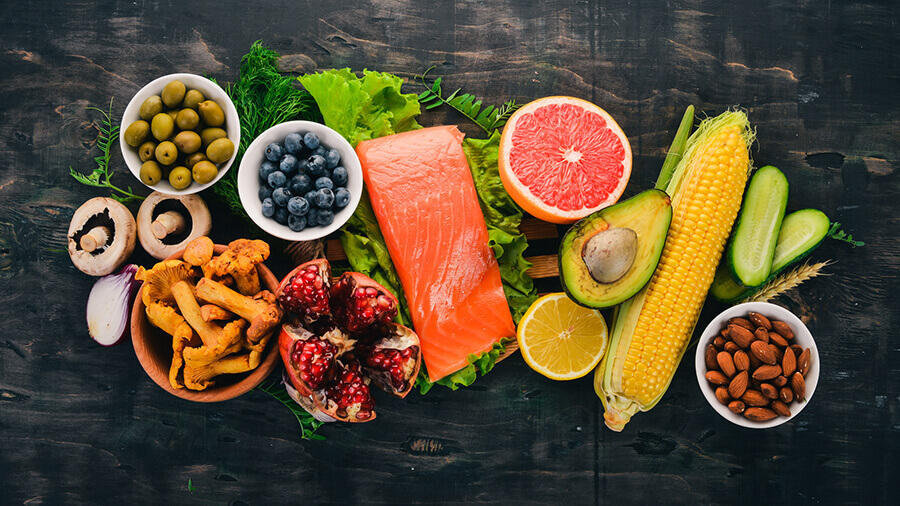4 Food Choices For Better Health
Whole foods, including fruits, vegetables, beans, and whole grains should be the foundation for your diet.
1. Eat whole foods
Whole foods are not processed. And they are free from artificial additives. This includes fruits, vegetables, beans, and whole grains. These should be the foundation for your diet.
2. Minimize added sugars
Sugars are “empty calories,” meaning that besides the calories, there is little to no additional nutritional value such as vitamins, minerals, or fiber. Besides contributing to weight gain, higher sugar diets can increase your risk for diabetes and heart disease.
A food item doesn’t have to say “sugar” to be sugar. In fact, corn syrup of any kind, honey, and brown sugar all count as sugar.
And you might be someone who feels like they “crave” sugar. But cravings are common if you eat high sugar or high simple carbohydrate diet. However, many people find that if they drastically reduce their sugar intake, they lose those cravings after a few days.
Sources of “Hidden” Sugars
- Corn Syrup.
- Fructose.
- Honey.
- Brown Sugar.
Many people find that if they drastically reduce their sugar intake, they lose those cravings after a few days.
3. Minimize saturated and trans fats
Saturated and trans fats can cause atherosclerosis. Atherosclerosis is the accumulation of fatty material in your blood vessels that can lead to heart attacks, strokes, and other vascular disorders. Further, these fats tend to be solid at room temperature and are primarily from animal sources. For example, they include butter, lard, shortening, and the fat in meats such as beef. And they are also found in pork products, dark meat, and poultry skin.
Saturated and trans fats can cause atherosclerosis, which is the accumulation of fatty material in your blood vessels that can lead to heart attacks, strokes, and other vascular disorders.
Common Sources of Trans Fat
- Butter.
- Lard.
- Shortening.
- Fatty Meat.
- Poultry Skin.
- Pork.
- Dark Meat.
Trans fats can be challenging to find on food labels. So, look in the ingredients for anything that is a “partially hydrogenated” oil. Regardless of what type of oil it is, it is a trans fat if it is partially hydrogenated. Even if the label says that there are no trans fats, if you find a partially hydrogenated oil in the ingredients, it has trans fats. In addition, trans fats are the worst of all the saturated fats for causing atherosclerosis. And they should be avoided even in small amounts. Food labels are allowed to state zero grams of trans fats if there are less than 0.5 grams of total fat per serving. But that small amount can still be significant to your health.
Trans fats are the worst of all the saturated fats for causing atherosclerosis and even small amounts should be avoided.
Better choices for fats are unsaturated fats, which are usually oils at room temperature and include polyunsaturated fats and monounsaturated fats. Healthier oil choices include olive, canola, safflower, and other vegetable oils (except coconut and palm oils). Coconut and palm oils are high in saturated fats, despite being vegetable oil, and should be avoided.
Healthier oil choices include olive, canola, safflower and other vegetable oils (except coconut and palm oils).
4. Minimize alcohol
In general, women should drink no more than one drink a day, and men no more than two drinks a day. For the purpose of weight, alcohol contains a lot of “empty calories.” Empty calories are calories that offer little to no nutritional benefit. Reducing alcohol intake is one strategy for weight loss.
Written by: myObMD team |Editor: Dayna Smith MD |Reviewed: December 18, 2020 | Copyright: myObMD, 2020
Glossary:
- Atherosclerosis– the accumulation of fatty material in your blood vessels that leads to heart attacks, strokes, and other vascular disorders.
- Carbohydrates are the sugars or starches in your diet.
- Whole foods are foods that are not or minimally processed, and without artificial additives.
References
- U.S. Department of Health and Human Services and U.S. Department of Agriculture. 2015 – 2020 Dietary Guidelines for Americans. 8th Edition. December 2015.
- Food and Drug Administration, Small Entity Compliance Guide: Trans Fatty Acids in Nutrition Labeling, Nutrient Content Claims, and Health Claims August 2003, Docket Number: FDA-2013-S-0610 Issued by: Center for Food Safety and Applied Nutrition, Content current as of: 09/20/2018.


